Octopus sleep cycle turns out to be human-like, possibly dreaming

Although octopus is an invertebrate, it has a
Cyclic alternation of quiet and active sleep states in the octopus: iScience
https://www.cell.com/iscience/fulltext/S2589-0042 (21) 00191-7
Octopuses have two alternating sleep states, study shows | EurekAlert! Science News
https://www.eurekalert.org/pub_releases/2021-03/cp-oht031821.php
Do octopuses dream of 8-armed sheep? New study hints at human-like sleep cycle in cephalopods | Live Science
https://www.livescience.com/octopus-sleep-cycle.html
We Have The First-Ever Confirmation of Alternating Sleep States in an Octopus
https://www.sciencealert.com/the-shifting-hues-of-sleeping-octopuses-indicate-a-second-sleep-state

Octopus can change its body color by expanding and contracting special pigment cells in the whole body, and while awake, it changes its body color according to the surrounding environment. On the other hand, when an octopus sleeps on the seabed, its body color becomes whitish, but it is also known that it repeats 'quiet sleep' and 'active sleep' and sometimes moves steadily to actively change its body color. I will.
You can see how the octopus experiences 'quiet sleep' and 'active sleep' by watching the following movie.
The two distinct sleep states of an octopus --YouTube
When sleeping quietly, the whole body of the octopus is whitish and the pupils are contracted.
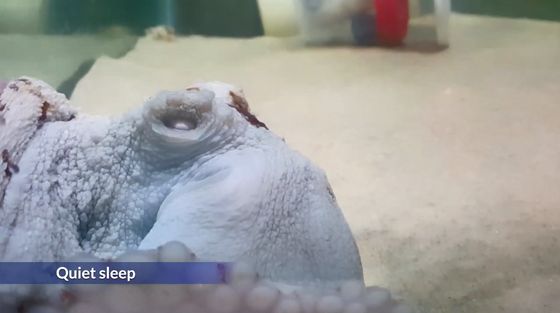
Although the head and arms may move slowly, it can be said that they are almost stationary.
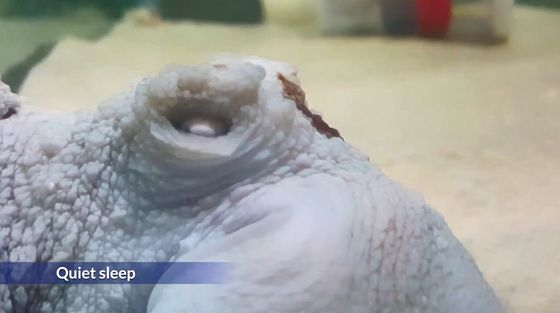
On the other hand, if you look at the octopus, which is said to be actively sleeping ...
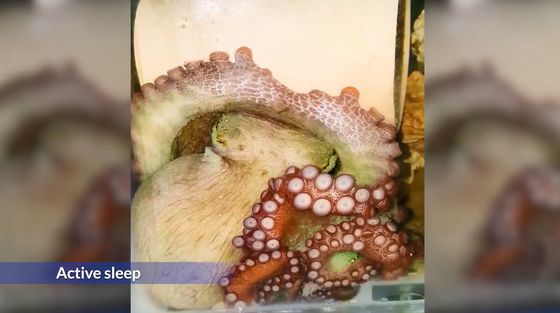
Not only does the body color change frequently, but the whole body is moving.
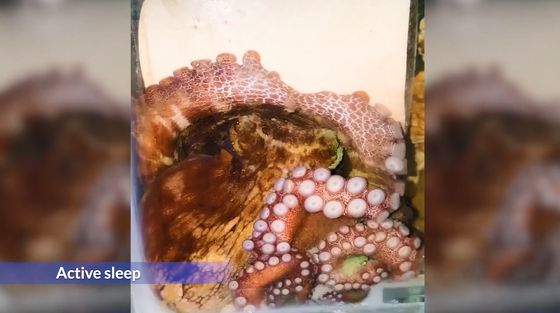
Apparently, the situation is different from quiet sleep, and the pupils may open.
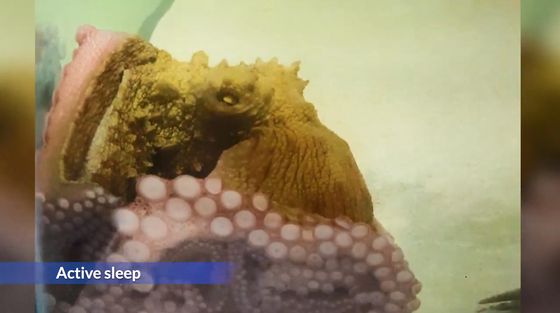
It has long been known that octopuses have two sleep states, but is the state of active sleep really asleep, or is it a 'quiet awakening state' of temporary awakening? Was unknown. Therefore, the research team investigated the time it takes for an octopus in two states to respond to a stimulus, and conducted an experiment to measure the 'awakening threshold'.
The octopus shifts to active sleep after a few minutes to 30 minutes of quiet sleep, but active sleep is only seen for a short time of tens of seconds to a little over a minute, after which the octopus sleeps quietly again. Move to. The research team points out that octopuses shift to active sleep at intervals of about once every 30 to 40 minutes, and have a predictable sleep cycle similar to humans, birds, and reptiles.
'I can't say that the octopus is dreaming, but our result is active sleep,' said Sylvia Medeiros, the lead author of the treatise and a graduate student at Rio Grande de Norte National University. It suggests that octopuses may later experience a condition similar to REM sleep. ' We know that humans dream during REM sleep, but the active sleep of octopuses is so short that even if they dream, they don't have a long story, they think it's like a short video clip. Has been done.
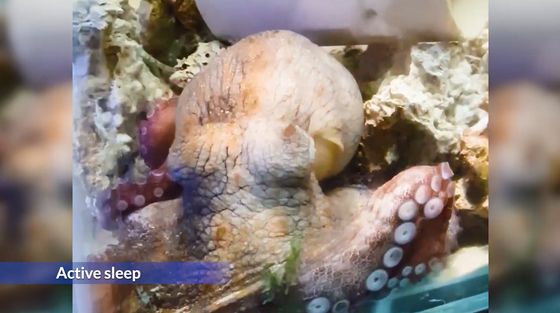
In mammals such as humans, REM sleep causes physiological changes that help convert short-term memory into long-term memory in the brain, but whether active sleep is involved in memory retention in octopus as well. I'm not sure. The research team plans to study the effects of changes in the octopus's sleep cycle on its ability to learn new tasks, as well as gene expression and protein construction that appear during active sleep.
Medeiros said, such as octopus cephalopods despite were differentiated and vertebrate to about 500 million years ago, pointed out that the point to have a sleep cycle, such as similar to a human being worthy of attention. 'When two different sleep states, quiet sleep (non-REM sleep) and active sleep (REM sleep), evolve independently in vertebrates and invertebrates, the essential evolutionary pressures that form this physiological process. What is it? ”, Suggesting that characteristics common to the complex central nervous system may be reflected in the formation of the two sleep states.
Related Posts:







